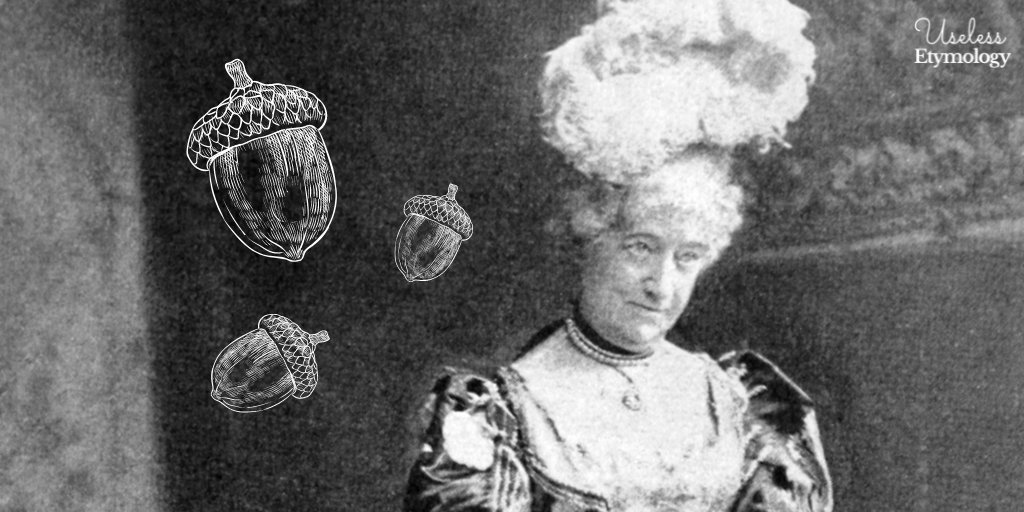Eggcorns and malapropisms: These are both terms for vocabulary faux pas — essentially an incorrect word that sounds similar to the intended word.
But each of these terms involves a distinguishing factor that sets it apart.
Malapropisms
With malapropisms, the mistaken word is blatantly incorrect, it doesn’t sense in context, and it’s funny or absurd when it happens. Basically, it’s clearly identifiable as an error by the average reader or listener.
Malapropisms are named after the fictional character Mrs. Malaprop, who first appeared in the 1895 play The Rivals by Richard Brinsley Sheridan. Her name is composed of the French mal à propos (literally “poorly placed” or “badly for the purpose”).
Mrs. Malaprop says things such as “pineapple of politeness” instead of “pinnacle of politeness, and “it gives me the hydrostatics” — rather than “hysterics” — “to such a degree.”
One of her most entertaining quotes, with the terms she was aiming for in parentheses:
“If I reprehend (apprehend) any thing in this world it is the use of my oracular (vernacular) tongue, and a nice derangement (arrangement) of epitaphs (epithets)!”
— Mrs. Malaprop, The Rivals, 1895
One literary critic aptly described using malapropisms as “word-fowling with a blunderbuss” — essentially taking aim at a word and hitting a different word by scattershot.
Most of the posts you see on Reddit’s r/BoneAppleTea subreddit (and the term “bone apple tea” itself, which is a malapropism of the French bon appetit) stand out as malapropisms rather than eggcorns because they are ridiculous, illogical, and blatantly incorrect, rather than being more common and understandable mishearings. Some of the most upvoted examples of all time include the use of “chupacabra” instead of “capybara,” “lemonade” instead of “laminate,” and “roast history” rather than “rotisserie.”

Eggcorns
Eggcorns tend to be more understandable mistakes that are closer to the intended word, and they’re not always funny.
Eggcorns were named by linguistics professor Geoffrey Pullum based on a case in which he observed someone substituting the word “eggcorn” for “acorn” and found the error charming because acorns are, in a sense, egg-shaped “corns” by the “single-grain” definition.
Because they are closer in sense, spelling or definition to the original word, they still make sense in context.
For example, you may be guilty of using an eggcorn when you write or say:
- “would of” instead of “would’ve”
- “ex-patriot” instead of “expatriate”
- “preying mantis” instead of “praying mantis”
- “old-timer’s disease” instead of “Alzheimer’s disease”
Eggcorns also tend to crop up in idioms:
- When you want to get to the root of a problem or put a stop to something, some people will say “nip it in the butt.” But the actual phrase is “nip it in the bud,” as in snipping the bud off of a plant so that it won’t blossom.
- You might have heard that a morsel of food will “whet your appetite.” It’s often spelled with the word “wet” as in water, but the correct term is “whet,” meaning to sharpen, as in a blacksmith’s whetstone.
These eggcorns all have something in common that malapropisms do not share: They still make logical sense, and they’re common mistakes that many people might make, typically because they haven’t seen or paid attention to a word or phrase in writing. That is, if you have trouble with eggcorns, you’re not alone.
Indeed, because language evolves with usage, many eggcorns have occurred so frequently that the incorrect version is gradually accepted as a correct alternative.
For example, the term “chomping at the bit” is accepted by some dictionaries despite originally being an eggcorn for the older term “champing at the bit,” in which “champ” was a common 16th century term for the chomping and chewing motions and sounds of ungulates such as horses and cattle.
Similarly, the older idioms “bald-faced lie” and “barefaced lie” have been largely replaced by “bold-faced lie.” Armchair etymologists on the web have suggested that the newer term “bold-faced lie” is supposed a reference to (false) news headlines, supposedly because they are printed in a bold typeface, but there’s no evidence that the term has ever been used that way in practice.
Meanwhile, malapropisms are more unusual, and they typically make your average reader chuckle at the error.
Is there overlap?
Yes. An absurd malapropism that can easily be misheard or is repeated often can enter common use and become an eggcorn.
Granted, there are some examples, such as “lie detective test” — which, though silly, at least makes logical sense compared to the correct “lie detector test” — that could be said to constitute both an eggcorn and a malapropism.

